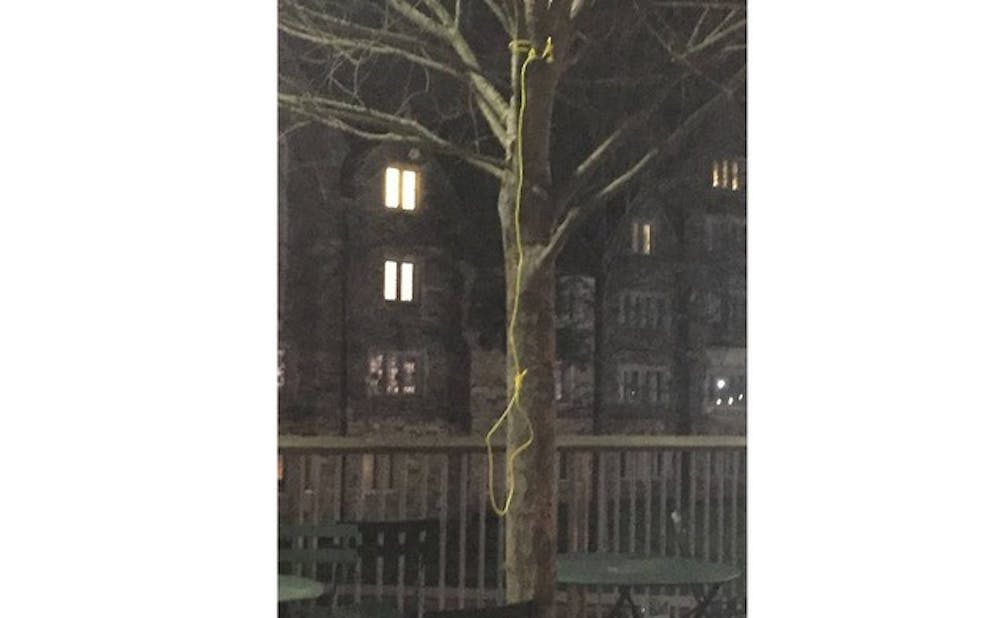A University investigation into the noose hanging in a tree on the Bryan Center Plaza April 1 found that the action was caused by a lack of cultural awareness and was not a statement related to racism, Duke announced Friday afternoon.
The student who hung the noose has gone through the student conduct process and after receiving a sanction is eligible to return to campus next semester. The student left campus the day after the incident occurred and has written an open letter of apology to the Duke community, which can be viewed below.
Vice President for Student Affairs Larry Moneta declined to comment on the timeline of the student conduct investigation and the time at which the letter was sent.
"My purpose in hanging the noose was merely to take some pictures with my friends together with the noose, and then texting it to some others inviting them to come and 'hang out' with us—because it was such a nice day outside," the portion of the letter explaining the cause of the action reads.
All other investigations by law enforcement have also been closed.
Sophomore Henry Washington responded to the University's announcement Friday with an open letter Saturday morning addressed to Duke administration titled "Did You Change Your Mind?" That letter can also be viewed fully below.
"Given the unequivocal responses released by other collegiate administrations in response to the racial aggressions they have addressed on their campuses, I urge you to reconsider the decision you have made on how to punish the actions of the student who hung the noose and how you choose to frame the noose hanging in archival history, " one portion of Washington's letter reads.
After the noose was discovered early in the morning April 1, student response was immediate. The Black Student Alliance led several hundred students in an organized protest on West Campus in the afternoon and student leaders and administration spoke at a forum in front of the Chapel in the evening.
Several campus groups also hosted discussions and spoke out against the action in the following days and the history department sponsored a town hall meeting to host a discussion about the history of lynching.
Although the University investigation found there was no racial motive, Moneta said Friday that the problems identified by students after the incident will still need to be addressed.
"We were also deeply involved in the impact the incident had on the community and will continue to have," he said. "None of us presume that just because we may have reached resolution in this specific matter that that changes the need to continue to work on inclusion, diversity, racism and bias. Those continue to be issues of concern."
As part of the student response to the incident, the Duke Student Government Senate pledged its support for requests for administration made by BSA and passed a statute to fund a Social Justice Fellowship, which would fund student projects geared toward increasing conversation and tolerance on campus.
Other “essential action items” identified by BSA in an open memorandum published March 31 include the creation of a pre-orientation program for black students to acclimate them to the culture of Duke and the publication of administrative incident reports concerning threats to community safety and instances of bias.
In addition, BSA asked for an orientation program for incoming students of all races to address issues of race, gender, class, religion and sexual orientation.
"Regardless of this particular incident and any closure that may happen, all the work acknowledged at the rally on the steps of the Chapel, all the commentary and correspondence shared, all the experiences identified by black students as relevant and authentic to them [all still represent] work to be done," Moneta said Friday.
After the results of the investigation were publicized Friday afternoon, reaction from students on social media and on campus was mixed, with many still criticizing the action if it was indeed simply an error in judgement.
"I was disappointed that someone could be so culturally unaware. A noose never had a positive connotation. Why would that in any context be appropriate?" freshman Lucy Cao said. "It makes me very skeptical of his intentions. You can't be that stupid. I think it was a very insensitive joke to make. I'm disappointed in the fact that a Duke student could be so insensitive."
Others focused on response from administration moving forward and remain curious how Duke will address BSA's demands.
"I like that Larry Moneta recognized that this doesn't discount the things that were discussed that week, but I wonder if the problems are still going to be addressed," freshman Chloe Ricks said.
The student's letter to the Duke community:
Get The Chronicle straight to your inbox
Sign up for our weekly newsletter. Cancel at any time.
Washington's letter in response to Friday's announcement:
This article was updated at 4:50 p.m. with Moneta's comments and additional context about the noose incident, late Friday evening with comments from the students and at 10:30 a.m. Saturday with Washington's open letter in response to Friday's events. Claire Ballentine contributed reporting.

